WHEN LOOKING FOR A JOB
Jobs pay money, and money pays the bills. That’s just the way things work. It’s not always easy, but it beats the alternative. (Because who wants to hunt wild game every day and then fend off large predators around the campfire every night?)

 Just remember: Jobs are hard to get. And not every job is something you want to do your whole life. Mowing lawns and flipping burgers is great when you’re young, but it’s tough to stay on your feet all day when you get older.
Just remember: Jobs are hard to get. And not every job is something you want to do your whole life. Mowing lawns and flipping burgers is great when you’re young, but it’s tough to stay on your feet all day when you get older.
So don’t just look for any job. Look for a job that will bring you happiness, some degree of security, and the satisfaction of being a contributing member of our society.
Applying for a Job
Before you apply for a job, consider what kind of job you’d like. There are many types of jobs in the world.
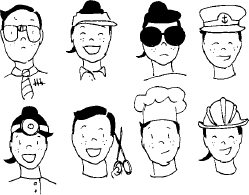
Then consider: Do your skills and experience match the needs of the job you want? If not, you might want to consider either gaining some skills or looking for a different kind of job.
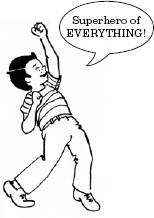 Once you’ve found a job that seems like a good match, there are a few things you should bear in mind. First, it is extremely important not to lie or “fluff up” your résumé. Present your skills and experience honestly. In the interview, always be professional and polite.
Once you’ve found a job that seems like a good match, there are a few things you should bear in mind. First, it is extremely important not to lie or “fluff up” your résumé. Present your skills and experience honestly. In the interview, always be professional and polite.
If you’re tempted to fudge what you know or have done, remember that this is just like cheating in school.
Like your teachers, employers would much rather know the truth about what you know and are capable of. They want to put you in a position where you will succeed. In that sense, they want what you want. (Plus, employee background checks are sure to turn up any real whoppers.)
 Lying on a résumé or misrepresenting yourself in an interview can have dire consequences. It can hurt your eligibility for the position you’re applying for, and it might even jeopardize your future job prospects as well.
Lying on a résumé or misrepresenting yourself in an interview can have dire consequences. It can hurt your eligibility for the position you’re applying for, and it might even jeopardize your future job prospects as well.
Not everyone knows how to do everything, and that’s okay. Turn any ignorance into an asset.
 Show them that you can be a team player. Express your enthusiasm for all aspects of the job, no matter how tedious. Convince an employer of that, and you might join that enviable but often elusive group: the employed!
Show them that you can be a team player. Express your enthusiasm for all aspects of the job, no matter how tedious. Convince an employer of that, and you might join that enviable but often elusive group: the employed!

WHILE GETTING READY FOR WORK
Did you get a job? Good for you! Jobs are great! Here’s everything you need to know about getting ready for a successful day in the workforce.
Before Beginning
Before you start each workday, make sure you get plenty of sleep and wake up with enough time to get ready at your own speed. You’ll get enough stress at work. Don’t start your day that way!

Instead, allow enough time to enjoy a hot beverage and a nutritious breakfast before heading out.

Proper Office Attire
When getting ready for work, choose clean, presentable clothes. Clothes should be lint free and comfortable. Make sure clothes are professional and not tight or constricting—loose, but not too revealing. Think about what others will be wearing. After all, you don’t want clothes so comfortable they make those around you uncomfortable.
For instance, this outfit is perfect for the club.

But at most office jobs, it will just confuse people.
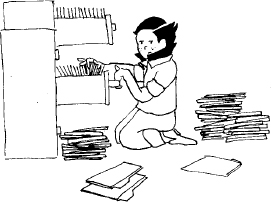
This outfit is perfect for an HBO series.

However, sitting might be difficult.

Save your high fashion for when you’re out with your friends!
Personal Hygiene
Make sure to shower and brush your teeth every day. Maybe even more than once! Work is filled with lots of people who interact with each other five days a week, month after month, year after year. If someone smells, everyone knows it! Don’t be that person! How can you tell if you are that person? Well, you might be the smelly one if others:
Recoil on sight.

Find a reason to cover their noses.

Offer you gum while you’re talking.


Half-gag.

Or have this look plastered across their faces.

This is especially true in the service industry, where putting people at ease and not ruining their appetites is the name of the game. If you want to earn good tips, avoid body odor and bad breath. Smell like nothing in particular, and you’ll be a winner!
A Successful Attitude
More than what you wear or how you smell, it’s important to have the right attitude when you come to work each day. Be ready to roll up your sleeves and put your nose to the grindstone.
If you normally lead a glamorous lifestyle, don’t let your social life intrude on your professional life. People are counting on you!
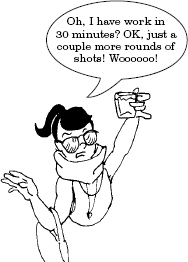
Sometimes this may mean slowing down a bit.
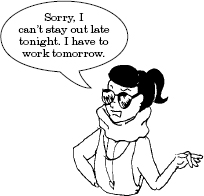
If you can’t take your foot off the gas—if you find your lifestyle is undermining your productivity—seek help.
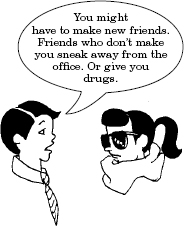
Most of all, when you arrive at work, you are setting the tone for your whole day. You may have deadlines, meetings, and responsibilities to juggle, but ease into your day with a calm demeanor and a confident smile.

Your coworkers will notice. If you arrive with a negative attitude, people will tend to avoid you for the rest of the day. Maybe that’s what you want, but that’s not the way to get it.
WHEN YOU’RE LATE
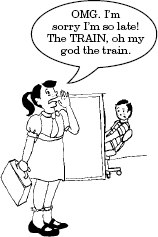 People are late to work all the time. It happens. And it is okay to be late every once in a while, but it can’t happen every other day. This is what bosses call being “chronically late,” and it does not look good on your performance review. However, whether this is your first time or your hundredth time, there are some things that you can do to at least improve the situation.
People are late to work all the time. It happens. And it is okay to be late every once in a while, but it can’t happen every other day. This is what bosses call being “chronically late,” and it does not look good on your performance review. However, whether this is your first time or your hundredth time, there are some things that you can do to at least improve the situation.
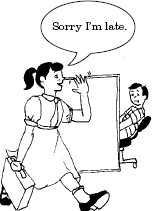 Just like homework, it doesn’t do anyone any good to make up dramatic excuses. If you’re late, you’re late. It doesn’t really matter why. Simply apologize and get right to work.
Just like homework, it doesn’t do anyone any good to make up dramatic excuses. If you’re late, you’re late. It doesn’t really matter why. Simply apologize and get right to work.
Everyone comes in late every once in a while. Everyone knows that sometimes the traffic really is bad on Highway 101 and you’re not just making it up.
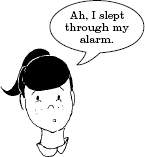 Even if you are, keep it simple. It’s more convincing than some loud, involved story. If someone asks what happened, simply say:
Even if you are, keep it simple. It’s more convincing than some loud, involved story. If someone asks what happened, simply say:
No one can argue with a faulty alarm clock. And people will appreciate your coolness under pressure. That is a highly valued skill in the workplace.
WHEN CALLING IN SICK
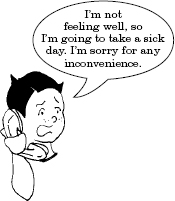 Same song, different tune. If you’re sick, you’re sick. If you can’t come in to work, simply call or email your boss and let him or her know. Say you’re not feeling well, so you will be taking a sick day, and you’re sorry for any inconvenience.
Same song, different tune. If you’re sick, you’re sick. If you can’t come in to work, simply call or email your boss and let him or her know. Say you’re not feeling well, so you will be taking a sick day, and you’re sorry for any inconvenience.
It really is as simple as that. You don’t need to be dramatic. This isn’t acting class.
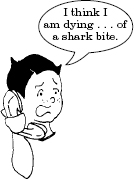 So long as your company is part of an industrialized nation, you will have sick days allotted to you. These days, many companies don’t even waste time calling them “sick” days, since people get “sick” so often. It may be called “allotted time off,” which you can use whenever and however you see fit.
So long as your company is part of an industrialized nation, you will have sick days allotted to you. These days, many companies don’t even waste time calling them “sick” days, since people get “sick” so often. It may be called “allotted time off,” which you can use whenever and however you see fit.
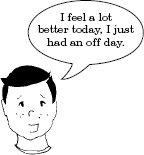 Whatever the case, when you come in the next day, people will ask if you’re feeling better and/or what was wrong. Maybe they care about you, and maybe they are just nosy. But you need to tell them something. So again, avoid the dramatics and keep it simple.
Whatever the case, when you come in the next day, people will ask if you’re feeling better and/or what was wrong. Maybe they care about you, and maybe they are just nosy. But you need to tell them something. So again, avoid the dramatics and keep it simple.
IN A MEETING
Meetings provide an opportunity for everyone to join together in discussing collaborative projects, work schedules, and common problems. Meetings are great time-saving devices. Imagine having to talk to each person individually. It would take forever.
Using the Time Well
Wasting time in meetings is a pet peeve of managers and coworkers alike. Don’t be guilty of this offense! Meetings usually have an allotted amount of time, and then people need to get back to their desks. So, in meetings, don’t let your mind wander; try to stay on track.
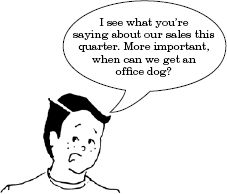
Avoid open-ended statements and general observations.

Make a real effort to contribute something of value. Do not talk just to prove how much you know.
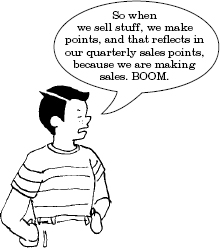
If you’re unsure, ask yourself the following questions:
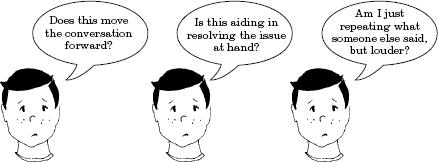
Above all, a meeting shouldn’t be a contest of wills for control of the discussion. A little listening goes a long way.
IN WORK CORRESPONDENCE
The internet and email have completely transformed the workplace (for more advice on dealing with the internet, see “On the Internet,” page 171). It used to be that we sat at desks writing with quills and ink, then we tapped at IBM Selectric typewriters, and now we sit in front of our computers all day long. It’s amazing how things change!
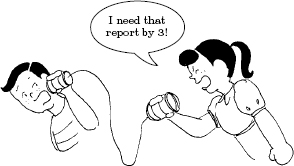
As a form of communication at work, email deserves special mention here. Perhaps the most obvious thing about it is that we can “talk” to someone without getting up from our desk or shouting across the room. This is a revolution offices were long waiting for.
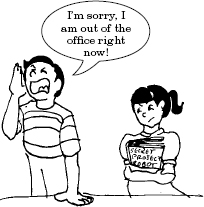
However, email comes with its own pitfalls and dangers. Emails can often seem less urgent than phone calls, for instance, and they can also lead to a more impersonal style of address. So the tone of our emails can often seem harsher or more curt than we intended.
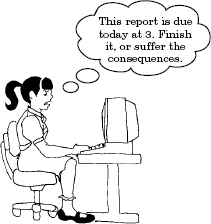
Communicate politely, and make requests nicely; thank people for their time. Adding a few exclamation points or a smiley face is a great way to convey a friendly tone! Most important of all, don’t hit send before reading your email. Make sure it says only what you want to say and nothing extra, and make sure you only send it to the people who need to see it. Even the friendliest email in the world won’t be appreciated by those who aren’t meant to receive it. They get enough email already!
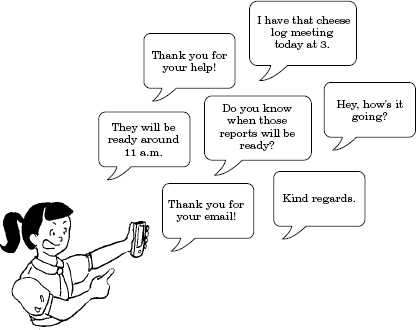
IN THE BREAK ROOM
Most offices have a common room where all workers can eat lunch and “take a break” from their hectic jobs. Just like living with roommates, everyone has to take care of the break room together. So clean your area after using it; a little maintenance goes a long way.
The Microwave
When using the microwave, put a paper plate on top of your food to ensure it doesn’t splatter all over the place. Then wipe out the microwave afterward. This is a workplace, not a science experiment.

The Communal Refrigerator
 The first rule of the break room is that other people’s food is off-limits. No matter how much better it is than your soggy sandwich, don’t eat other people’s lunch from the fridge. This has been the cause of many workplace arguments.
The first rule of the break room is that other people’s food is off-limits. No matter how much better it is than your soggy sandwich, don’t eat other people’s lunch from the fridge. This has been the cause of many workplace arguments.
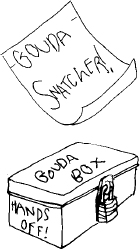 If someone does steal your food, do not leave passive-aggressive notes. Remember: You are just trying to reach one person, but a note infuriates everybody.
If someone does steal your food, do not leave passive-aggressive notes. Remember: You are just trying to reach one person, but a note infuriates everybody.
If you find your food is being eaten, try using a lockable box. Or keep your lunch at your desk in a cooler pack or minirefrigerator. The thief will then move on to easier pickings.
Loose Lips Sink Ships
Finally, while the break room is a place to relax, don’t drop your guard completely. You never know who may be in the break room with you. Keep your conversation light. If you have a personal topic to share or too much anger to hold inside, take it outside of the building.

IN THE BATHROOM
It’s important to treat your work bathroom in the same way that you would treat your home bathroom. Which basically means you need to clean up after yourself! It’s only respectful to those using the restroom after you.
Lift the Seat, Gentlemen
 One of the most frustrating things for bathroom users is finding pee on the seat. Yuck!
One of the most frustrating things for bathroom users is finding pee on the seat. Yuck!
You may think that you have great aim, but this is not target practice. Save that for outside. At work, take the extra time to lift both the lid and the seat. Then, if you forget or your aim isn’t all that it once was, simply wipe off any wayward drops.
Wipe the Seat, Ladies
 Now we will address the ladies’ room! Ladies, you know there’s nothing worse than finding a peed-on seat. But here’s a news flash: It’s not just the boys who are the culprits. Many ladies are grossed out by public bathrooms and prefer to hover over the seat while peeing. The less contact with the seat, they think, the better. However, more distance means more splashing. And where does all that splashing urine land? On the seat.
Now we will address the ladies’ room! Ladies, you know there’s nothing worse than finding a peed-on seat. But here’s a news flash: It’s not just the boys who are the culprits. Many ladies are grossed out by public bathrooms and prefer to hover over the seat while peeing. The less contact with the seat, they think, the better. However, more distance means more splashing. And where does all that splashing urine land? On the seat.
Be polite and keep it tidy, ladies! Take the time to wipe it down afterwards!
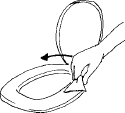
Or, use a seat cover.
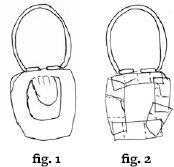
And if seat covers are not in supply, you can make your own out of toilet paper! DIY sanitation!
The Stall Is Not an Office
When people say they need to go “take care of some business,” they don’t mean actual business! So get in and get out. Don’t stand in front of the stalls chatting with your friends, tweeting updates on your cell phone. This can make other people feel uncomfortable.
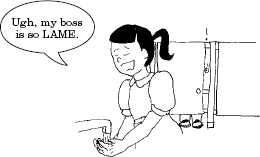
Always Wash Your Hands
When you’re at work, that sign means you!

WHEN YOU HATE THE BOSS
 A good boss is hard to find. And even the best bosses can become tiring after enough time. In fact, your relationship with your boss might seem a lot more like a friend, sibling, or even a parent.
A good boss is hard to find. And even the best bosses can become tiring after enough time. In fact, your relationship with your boss might seem a lot more like a friend, sibling, or even a parent.
If you are having trouble with your boss, try to keep a few things in mind. First, try to understand the boss’s perspective. They have a lot riding on their shoulders: meetings to deal with, a team to run, bottom lines to watch, and people’s feelings to keep from stomping all over.
Receiving Criticism
Most bosses would love it if all they had to do was praise their workers. But unfortunately, part of a boss’s job is to let employees know when they are doing something wrong or not working to their full potential. When this happens, it’s important to handle such feedback in a professional way.
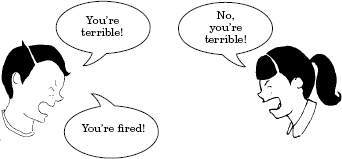
 Listen to what your boss is telling you without becoming defensive or going on the attack. No matter how unfair the criticism might be, it is not a good idea to lose your temper. Remain calm and collected. When your boss is finished, thank her for caring so much about you and your work.
Listen to what your boss is telling you without becoming defensive or going on the attack. No matter how unfair the criticism might be, it is not a good idea to lose your temper. Remain calm and collected. When your boss is finished, thank her for caring so much about you and your work.
Later on, if you disagree with your boss’s criticism or you feel she may have confused you with another worker, approach her in a nonconfrontational manner and ask her if you could chat for a minute.
Let her know, in a professional manner, how you feel.
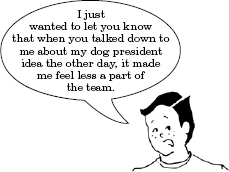
By accepting criticism and working together with your boss to solve the problem, you can both create a better, more efficient workplace.
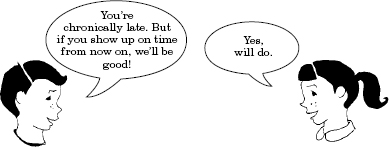
WHEN YOU ARE THE BOSS
If you have worked your way to the top of the ladder, congratulations are in order. Here are some helpful tips to ensure that your time in charge runs smoothly. First, enjoy the view while it lasts.
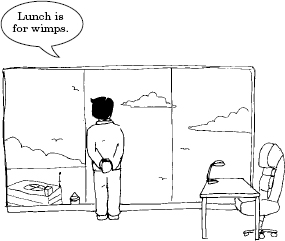

Building Team Spirit
As the boss, you have a team of people looking to you for leadership. So lead! Give them direction and work to do.
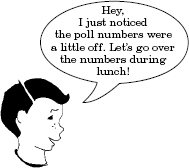 But don’t be tyrannical about it. People respond better when they are confident and happy in their work. If a problem arises, pull the relevant people aside and talk to them in private. This will lessen their embarrassment in front of the rest of the team.
But don’t be tyrannical about it. People respond better when they are confident and happy in their work. If a problem arises, pull the relevant people aside and talk to them in private. This will lessen their embarrassment in front of the rest of the team.
 Then, present the problem as you see it, express what you expect from your team, and suggest ways you can work together to fix things. It is a privilege to have people work for you. Never take that for granted. Remember: You may be the boss, but you’re not a dictator!
Then, present the problem as you see it, express what you expect from your team, and suggest ways you can work together to fix things. It is a privilege to have people work for you. Never take that for granted. Remember: You may be the boss, but you’re not a dictator!
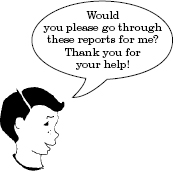 You can still be a tough boss, and you can push people to work their hardest, just make sure that you never treat people disrespectfully. After all, they’re the ones doing most of the work. Treat your employees fairly, and everyone profits!
You can still be a tough boss, and you can push people to work their hardest, just make sure that you never treat people disrespectfully. After all, they’re the ones doing most of the work. Treat your employees fairly, and everyone profits!
Wielding Power
As a boss, you have a lot of power. In some positions, you may find your power to effect change extends beyond the boardroom and into society itself. Lots of people—and even other companies—may listen closely to what you say and do.

Perhaps you’ve found a loophole in government regulations— one that can make those able to exploit it very rich.
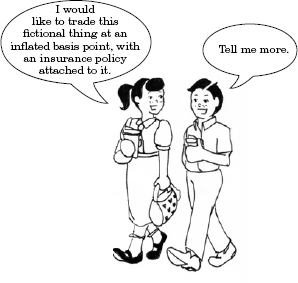
Just make sure you always consider the larger ramifications of your actions.

WHEN WORKING FROM HOME
Whether we’re talking about flex time, work from home, or part-time hours, today’s evolving employment policies have many benefits. At home, workers can meet deadlines, respond to emails, and check in on projects in pajamas or stretch pants!
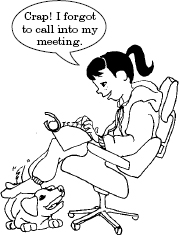
When Using a Coffee Shop as Your Office
With a Wi-Fi connection or an internet link, you can work from almost anywhere: a park, a train, the doctor’s office, or the beach. A coffee shop, for instance, often offers a constant supply of Wi-Fi. Plus, it provides you with a change of scenery.
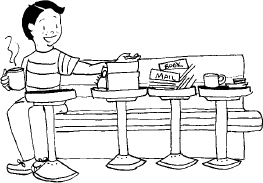
Just remember: A coffee shop is also a business and someone else’s workplace. Be courteous and respectful. And be sure to tip the staff.
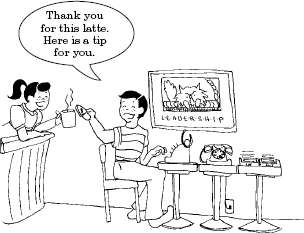
Treat servers like your coworkers and the coffee shop owner like your landlord—one who charges really cheap rent.
If business is slow, then using an entire table all day is usually no problem. Just keep smiling and ordering another cup of joe. However, if the coffee shop gets crowded, share your table with others, or take a much-needed break. Your fellow work-athomers will appreciate it!
The coffee shop will appreciate it, too. If your presence drives customers away and the coffee shop loses money, then it might go out of business. Then where will everyone go to work at “home”? Do your part. After all, “It takes a village!”
AT OFFICE PARTIES
When your work day is done, try to enjoy some time out with a few coworkers. This can be a great way to bond and learn more about them. The same is true for any parties your office hosts. Take the opportunities that birthdays and other office parties provide to talk about things other than work or to pass along praise you just didn’t get a chance to share during your busy day.
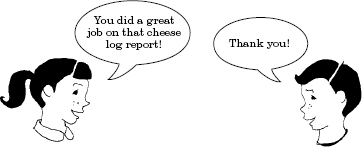
Keep the conversation fun and light! Talk about sports, funny viral videos, music, or news of the world. Avoid getting too personal or passing judgment on what people do in their off-hours. People are bummed out enough during work. They don’t want to be bummed out after work, too!
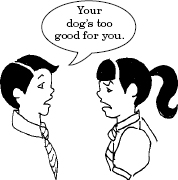
Behave Responsibly
If you go out after work with your team, it’s fine to relax. That’s the whole point. But don’t get too relaxed. Let your hair down, just not all the way. Remember: You’ll be seeing all these people again tomorrow!

So pay attention to what you drink—and order thoughtfully.

If anything, you want to stay behind the curve on the party’s enthusiasm. Find your happy place and maintain it.
The main reason for this is so that your mouth doesn’t become disconnected from your brain. The last thing you want is to replace your eyeglasses with sarsaparilla goggles and to start voicing inappropriate remarks about someone you work with.

These are your coworkers, not your close friends. Avoid offcolor remarks, no matter how funny you may think they are. Remain professional and treat everyone with respect.
The Next Day
Okay, it happens. Everyone makes a faux pas at one time or another. If you feel you have behaved inappropriately or spoken out of turn, take a moment to review the situation. Perhaps you made fun of your boss?

Or maybe you made advances toward a coworker?

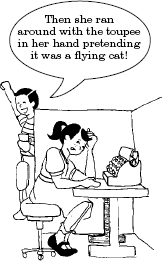 Or maybe you’re just not sure what you did. Well, if it’s juicy, you can bet other people in your office won’t have forgotten what happened.
Or maybe you’re just not sure what you did. Well, if it’s juicy, you can bet other people in your office won’t have forgotten what happened.
By the next day, there’s nothing you can do about it. The story will get around. Don’t be surprised if it even gets a little exaggerated.

 In that case, apologize to any inadvertent victims of your behavior.
In that case, apologize to any inadvertent victims of your behavior.
Then, remember that most people do something that they are embarrassed about at one point or another. Take your own embarrassment in stride.

IN AN OFFICE ROMANCE
If you spend a lot of time at work, you might meet someone you’re interested in. While it’s okay to mix business with pleasure, it’s not prudent to enjoy that pleasure during business hours. From nine to five, you have a job to do, so focus on doing it.
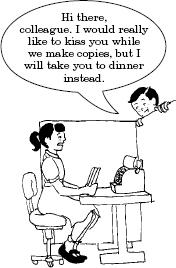
Before You Dive In
Dating someone else is never a simple proposition, and dating someone you’re working with increases the complication factor significantly. So before you get involved with a coworker, take a moment to reflect.
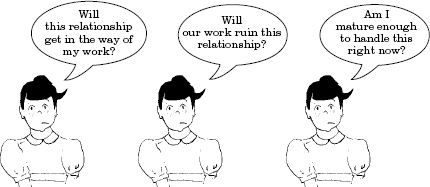
Avoiding the Appearance of Impropriety
 If you do decide that you’re ready to instigate an office romance, be aware that your relationship is likely to draw some attention. In fact, some people may wonder if the motives on both sides are entirely pure. This is another important question to ask yourself before diving in: Are you likely to receive preferential treatment as a result of this relationship? If your work responsibilities shift as your relationship changes, that’s a problem. And if you find yourself in that situation, you’re likely to feel some tension from your coworkers as well.
If you do decide that you’re ready to instigate an office romance, be aware that your relationship is likely to draw some attention. In fact, some people may wonder if the motives on both sides are entirely pure. This is another important question to ask yourself before diving in: Are you likely to receive preferential treatment as a result of this relationship? If your work responsibilities shift as your relationship changes, that’s a problem. And if you find yourself in that situation, you’re likely to feel some tension from your coworkers as well.
But if everything is aboveboard and everyone’s mature enough to give this relationship a shot, you should still make an extra effort to keep your relationship to yourself. Don’t share the details of your romantic life with the whole office. If you have a fight, or break up, act as if nothing has changed.

DURING PERFORMANCE REVIEWS
Performance reviews are stressful. They can also be frustrating, especially if you feel you are not being compensated fairly for your work. Perhaps you suspect that your boss has some unspoken bias—be it gender or racial, or that of a jilted lover—and that he or she is deliberately holding you back. Nevertheless, it is not a good strategy to cry or lose your temper during a performance review.
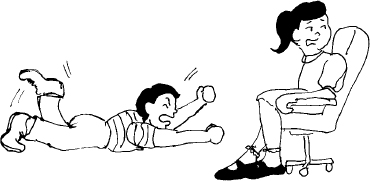
Like umpires in baseball, bosses aren’t likely to change their call just because you are crying or yelling at them. In fact, these are forms of emotional manipulation and display poor judgment. Remain professional and outline your disagreements in a respectful way. Understand they may not have control in the situation, and ask them what you can do to improve your chances of success in the future.
Asking for a Raise
Many employees take the opportunity of a performance review to ask for a raise. If that’s your plan, take care to get your ducks in a row first, and make sure you’re prepared to state your case.
Have you been working hard and achieving deadlines?
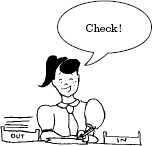
Have you been exceeding goals and performing duties beyond your job description?
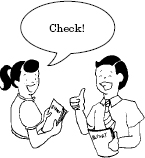
Have you been putting in more hours than are required?

If so, then you are on the fast track to success! In addition, you have good grounds to ask for a raise. When the moment is right, politely state your case.
Most companies are happy to reward employees who work hard. Of course, those rewards may vary. If a clap on the back or a holiday cheese log doesn’t fit your expectations, be honest about how you feel and present solid evidence that your employer’s compensation doesn’t meet industry standards. Show examples and present charts for why you deserve a higher income. At the very least, let your boss know that you’re disappointed.
WHEN LEAVING A JOB
Nothing lasts forever, and that includes employment. Perhaps you found a better job, or you’re moving away, or you’re going back to school to be retrained in a profession that pays a living wage. Whatever the case, here’s some advice for when it’s time to seek new horizons.
Giving Notice
If you’re leaving your job, give your boss a reasonable amount of notice. Two weeks is considered standard, but of course, it depends. Two weeks gives the company at least a reasonable amount of time to fill your position with a minimum of upheaval.
Be nice about it. They’re the ones who have to stay behind, after all. Thank your boss and coworkers for the opportunity to learn and grow with them.
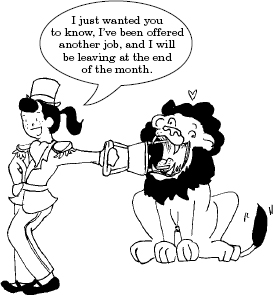
When You’re Fired
If you’ve been fired, you might feel angry. In fact, you might want to leave in a dramatic fashion.

However, it’s unwise to burn your bridges. You never know what the future may bring. You might need your boss’s recommendation. You may even want your old job back.

Try leaving on a good note. No matter how good or bad your time has been, you’ve certainly learned something.

WHEN YOU’RE UNEMPLOYED
You may consider unemployment terrifying, or perhaps a blessed relief, but being without a job doesn’t mean there isn’t work to do. You have to apply for unemployment benefits, first of all, and of course, you have to find a new position. So keep your head up and make do with the money you saved when you were employed. That rainy day you were waiting for? It’s here!
No rainy day fund? Well, don’t get mad at your friends just because they’re still having fun.

Instead, suggest something you all can do together that costs little or no money.

